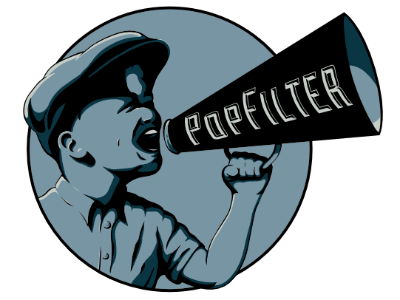POP FILTER VS. THE CLASSICS
POP FILTER
VS
THE CLASSICS of COMEDY
MODERN TIMES
There’s always an internal conflict when viewing and reviewing a classic film. Well, classic anything really. Is the piece good for its time, or good for all time? Are you judging it harshly because you recognize all of its tricks? Do those tricks exist because of the piece you’re consuming? If you don’t take these questions (and by no means is that a comprehensive list) into consideration, you’re doing yourself, and the piece, a disservice. And I mean this just for casual viewing. You can respect something without necessarily enjoying it. To give a personal example: the Ramones. I’ve never thought to myself, man I really need to put on the Ramones right now. If I feel like listening to punk I want it hard and fast, and they just don’t do it for me. But I can definitely recognize and respect that the bands I adore wouldn’t be around without them. To ignore that would make me an ignorant ass and I think I’d enjoy it all less. History is important kids.
That being said, there are things so great that they transcend the need to simply respect what they did. Mark that in the “good for all time†category. Every time I’ve come across one of these, it’s blown me away. Mostly because it often happens with silent films, and who wants to sit around for an hour plus with no dialogue? I went into Modern Times assuming I’d probably come away with respect for what it did, but I never thought that it would be such an entertaining and hilarious experience. It’s a proto-romantic comedy, but only becomes so halfway through after fully establishing Charlie Chaplin’s protagonist in the world. It makes the movie feel almost episodic, but that works out in its favor; we get to see the Tramp go through different aspects of life and they don’t necessarily need to be tied perfectly together because they’re connected very well thematically. The reason the central relationship between the Tramp and an orphan girl called “the Gamine” works better here than in most romantic comedies is that we get a fully-fledged view of each on their own. Without being tied-down by annoyingly expositional dialogue, the two show who they are in how they deal with the world around them. Though they have different motivations, neither quite fits into the ‘modern times’, so it makes a lot of sense that they come together, first as a sort of-friendly partnership, before totally boning (off screen, and assumed).
Neither of the main characters are great people. The Tramp is pretty shitty at most jobs and doesn’t mind drinking at inopportune times (he’d fit in well at YPF). The Gamine steals from whomever she needs to, like a lady-Aladdin. But the key to them both is that they’re creatures of circumstances. The Gamine has to steal in order to eat and feed her family and the Tramp has nothing going for him, so why not drink? But neither is a bad person – they’re reacting to the overreactions and squareness of everyone around them. That could also be the message of the movie itself. Even though talkies were in full effect for years, Chaplin said fuck that and made a silent film. The one time we get to hear his voice he sings in complete gibberish. This scene is essentially an old-timey fuck you to people wanting him to blend in with the trends of the times. If you want to hear his voice, then it’s gonna mean nothing. The fact that this movie works better than most romantic comedies today shows Chaplin wasn’t wrong. Talking doesn’t make a good story; a good story makes a good story. To put that in today’s terms: 3D, Imax, and rumble chairs don’t make a good movie; just make a good fucking movie.
Even throughout this is a fairly heavy story about a depressing time in our history, the laughs are there in force. It’s physical comedy at its silly best and the set pieces and gags are so good that you can still see their influence today. The most heavy-handed part of the film is in the first minute when a bunch of sheep go running by. There’s a single black sheep doing his own thing. It then cuts to The Tramp working in a factory. Given how good the rest of the film is, let’s just chalk that up to Chaplin realizing how dumb people back in the ‘30s were and needing to make sure his message was understood. -MG

